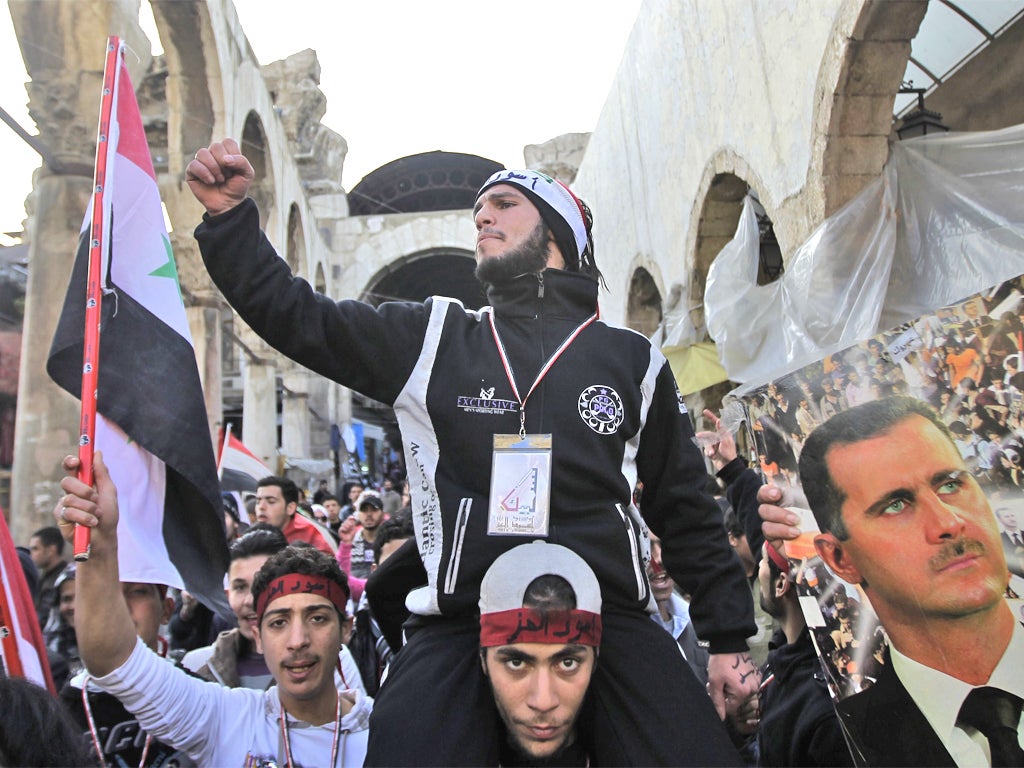Robert Fisk: Assad faces his people's hatred – but as their anger grows, his excuses are still just the same


Your support helps us to tell the story
From reproductive rights to climate change to Big Tech, The Independent is on the ground when the story is developing. Whether it's investigating the financials of Elon Musk's pro-Trump PAC or producing our latest documentary, 'The A Word', which shines a light on the American women fighting for reproductive rights, we know how important it is to parse out the facts from the messaging.
At such a critical moment in US history, we need reporters on the ground. Your donation allows us to keep sending journalists to speak to both sides of the story.
The Independent is trusted by Americans across the entire political spectrum. And unlike many other quality news outlets, we choose not to lock Americans out of our reporting and analysis with paywalls. We believe quality journalism should be available to everyone, paid for by those who can afford it.
Your support makes all the difference.It was the Assad Speech of the Year. There was an international conspiracy against Syria. True. Arab states opposed to Syria were under "outside pressure". True, up to a point. Nobody could deny the seriousness of these plots. True. After all, the Syrian government itself registers 2,000 dead soldiers, while the UN estimates civilian dead at 5,000. And when Turkish Prime Minister Erdogan warned that the violence in Syria was "heading towards a sectarian, religious war", there were few supporters of President Assad who would disagree with him.
As for foreign plots, who doubts that weapons are pouring into Syria from Assad's enemies in Lebanon? Syria's Defence Minister, Fayez Ghosn, has stated that al-Qa'ida had infiltrated the northern Lebanese town of Arsal – a dodgy claim since the only death there appears to have been caused by Syrian troops. The Lebanese Druze leader, Walid Jumblatt, still nominally an Assad ally, suggested officials should not use such all-encompassing words that mean anything to anyone. True again. Jumblatt said the recent explosions in Damascus that killed at least 25 Syrians raised "many questions" – because they coincided with the Arab League monitors' visit.
So far, then, so good. Assad also promised a referendum on the constitution around March and elections mid-year. The problem, of course, is two-fold. Although President Assad was giving his first public address in six months, it contained little new. The foreign plotters, the Arab states under foreign pressure, the threat to hit the regime's armed enemies with "an iron fist", are statements that we have all heard before.
What has changed, however, is the extent and speed of the deterioration in Syria, an ever more blood-curdling battle in which Assad's opponents are ever more heavily armed and readier to assault the regime's forces. The "Free Syria Army" or the "Free Army" is steadily growing in size, although it will not be taken seriously by its armourers unless whole Syrian military units defect.
Assad's government, however, has still found itself unable to deal with the news side of the crisis. By allowing few international journalists to enter the country, officials have allowed the stunning YouTube images of the opposition to lead public opinion. When Al Jazeera can broadcast a Muslim imam in a crowded mosque shouting "Assad's soldiers – God curse them – say Assad is their God; if that doesn't make you angry, what will?" and then give specific details of protesters' demonstration tactics in a suburb of Damascus, the Syrian Ministry of Information has a real problem.
The President can say – as he did yesterday – that "according to the law, nobody should open fire – only in self-defence or in a battle with an armed person", but dozens of YouTube phone videos on Al Jazeera suggest that such laws are widely ignored by the regime.
Of course, Al Jazeera is funded by the Emir of Qatar, and the Qatari royal family's influence has now reached its zenith in the Arab League – which has threatened to allow the whole bloody business to go to the UN Security Council. It's not difficult to see how – from a sparse Baathist drawing room – this looks more like conspiracy than coincidence. The League has been boasting of its sense of resolution, while Assad believes it was his idea to bring the League's monitors to Syria. And that's exactly what he told us all yesterday. The Kuwaitis, meanwhile, said that two of their League military monitors in Syria had been slightly wounded by "unidentified protesters". It would be interesting to know whom the protesters were protesting against.
Mission to Syria: Arab League unease
22 December Arab League delegates start arriving in Syria to monitor a plan calling for the withdrawal of troops from cities.
23 December Syria suffers its first suicide bombing since unrest began in February. Forty people are killed, but activists are suspicious of the timing.
27 December Foreign Policy magazine labels the mission's Sudanese head, Mohammed Ahmed al-Dabi, the world's worst human rights observer because of links to abuses in Sudan.
28 December General Dabi says the situation in parts of Syria is "reassuring". The next day, 25 people are shot dead by security forces.
1 January A body advising the Arab League says it should pull monitors out.
5 January Qatar's Prime Minister admits Arab League monitors made "mistakes".
6 January Another bomb explodes at a busy intersection killing 26 people, with state media blaming "terrorists".
Join our commenting forum
Join thought-provoking conversations, follow other Independent readers and see their replies
Comments